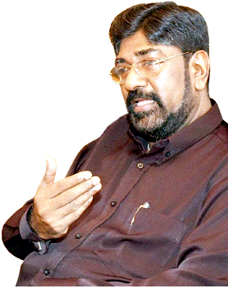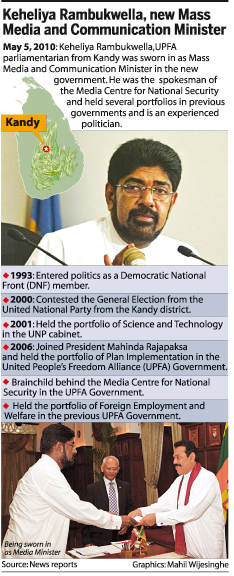New approach towards media - Minister Rambukwella
 New Mass Media and Communication Minister
Keheliya Rambukwella, in one of his first interviews after assuming
duties in his new office, on Friday says he wants to be open and free
with all sections of the media. “I believe in a relationship where we
could disagree, argue and completely ignore each other, but no one has
the right to insult each other.” New Mass Media and Communication Minister
Keheliya Rambukwella, in one of his first interviews after assuming
duties in his new office, on Friday says he wants to be open and free
with all sections of the media. “I believe in a relationship where we
could disagree, argue and completely ignore each other, but no one has
the right to insult each other.”
Minister Rambukwella says he is concerned
with improving the conditions for journalists and their welfare and will
aim at shifting the overall approach of the local media to fulfill the
needs of a post-conflict nation, primarily peace and development.
By Manjula FERNANDO
Q: The Ministry of Mass Media and Communication is considered
a difficult, unpopular and hard-to-perform portfolio. What is your view
on this?
A: There is nothing entirely black and white. There is good
and bad in everything. That is how I look at it. I have been in charge
of three ministries up to now. I have been quite content with the
outcome and their performance during my tenure.
Having said that, I must also say that media and information is
something which needs an altogether different approach. It has to be
acceptable, the truth has to be disseminated, people should be fed with
the truth so that they know what is going on around them.
I have handled the media for four years. We have an extremely healthy
rapport and sound understanding. I believe in a relationship where we
could disagree, argue, completely ignore, but no one has the right to
insult each other.
Q: What will be your priority areas? Will you consider
journalists’ welfare, improving working conditions and their training as
areas needing priority?
A: These will be among the priorities. But there will be an
overall new approach.
This is the post-conflict era, the society is now beginning to think
differently. You need to look at it in that context. Then you realise
that we have a strong platform for national development, development
which we never saw during the last three decades.
 The outlook of the people, the mentality of the people and the
temperament are all different now. We must understand this and poise
ourselves to cater to their different media needs. We have to get on
with our democratic processes and of course post-conflict peace and
development should be a priority. The outlook of the people, the mentality of the people and the
temperament are all different now. We must understand this and poise
ourselves to cater to their different media needs. We have to get on
with our democratic processes and of course post-conflict peace and
development should be a priority.
The current attitudes of sections of the media need to change and I
believe this could be done with consultation and understanding.
Q: What will be your policy towards the private and
international media?
A: They have been in existence for decades. I believe they
need to understand their responsibilities clearly and the definite role
expected of them by society.
As for the relationship between the authorities and the private
media, we should be able to sit around tables and discuss matters like
decent human beings and iron out differences that may crop up from time
to time.
It’s a continuous process. The media is not going to be static.
Issues of the media, the competition between the private media, etc.
will give rise to fresh challenges everyday.
So you need to work with them with an open mind. You cannot start
your day with conclusions and pre-determinations and bank your decisions
on those convictions.
Q: What have you got to say about the accusation, particularly
directed from the Western bloc, that media freedom in Sri Lanka is
suppressed?
A: I have been fighting against this allegation for the past four
years as a media spokesman. We need to improve certain areas, but at the
same time the people who point their fingers at us must illustrate a
cleaner record, which is not the case in most instances. I can pinpoint
some clear cases, but I don’t want to do it at this point since I have
just assumed duties. I certainly don’t want to dwell on those past
issues. I would like to start with an open mind and not take into
consideration what happened during the conflict. I was handling the
media during the most difficult period as the Government Media
Spokesman. We were accused of many things and I had to put the record
straight while maintaining a healthy relationship with the international
and private media. That relationship still continues.
Q: The pension scheme for media personnel had been a promise
of many of your predecessors. But this promise still remains a distant
dream?
A: Making dreams a reality makes you a ‘doer’. I would like to
think that way. Of course there can be financial constraints that we
have to overcome first.
I believe in the senior citizens charter as well. Not just media
personnel, but basically all senior citizens who were the driving force
behind the country’s development should be looked after during their
retirement age. The Senior Citizens Charter is very prevalent in
developed countries.
Q: Dr. Mervyn Silva resigned from the post of Deputy Media
Minister on Friday, the day you assumed duties in your new office. Who
will be your new deputy minister?
A: That is the prerogative of the President.
|

